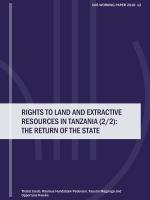State companies are back in Tanzania's extractive sectors
African states are often depicted as being 'weak' when dealing with extractive companies. This may, however, be changing. In Tanzania, a number of reforms has strengthened the role of the state in governing oil, gas and mining investments over the last decade. Regulation has become more demanding and the stakes of state-owned companies are on the increase. The resurgence of the state in the extractive sectors affects other actors, notably smallholders and investors, correspondingly.
This new working paper examines changes in contemporary mining and petroleum legislation and their implications for smallholders, investors and state actors. It pays particular attention to rights related to the acquisition of land for investment projects as these processes are complex and often cause tension and mistrust. Overall, the paper argues that the return of the state as an investor signifies a major shift in bargaining power between the state and investors. The implications for smallholders are less clear.
The paper is second of two papers on rights to land and extractive resources in Tanzania. The first paper, 'Rights to land and extractive resources in Tanzania (1/2): The history', analysed the historic changes in rights related to oil/gas and mining projects. The papers are published as part of the research programme, 'Hierarchies of Rights: Land and Investments in Africa' Hierarchies of Rights - Land and Natural Ressource Investments in Africa.
Thabit Jacob, PhD candidate at Roskilde University and University of Dar es Salaam
DIIS Experts


